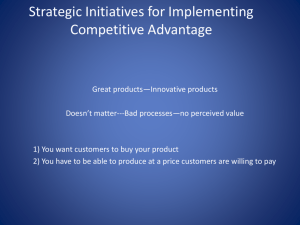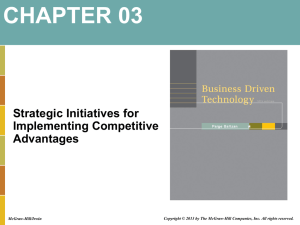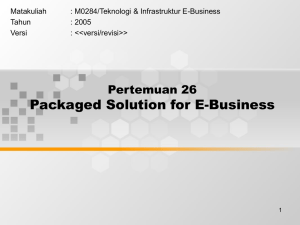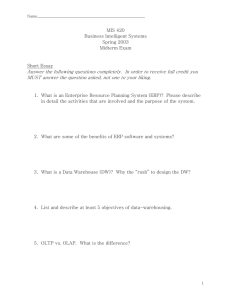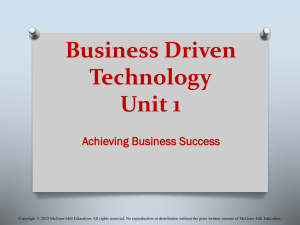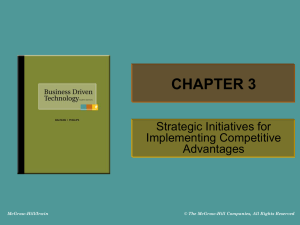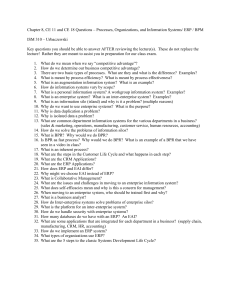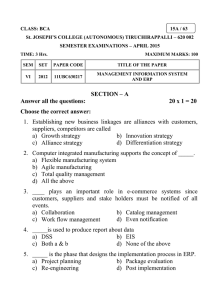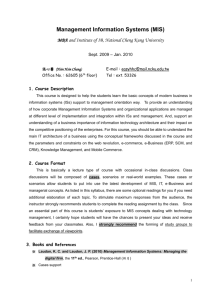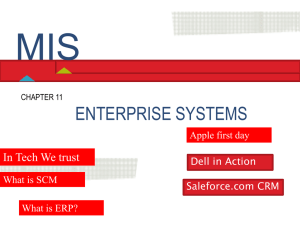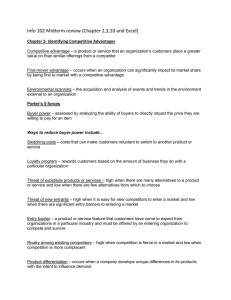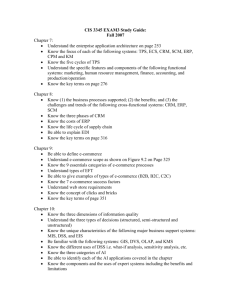oldC3StrategicInitiativesForCA
advertisement
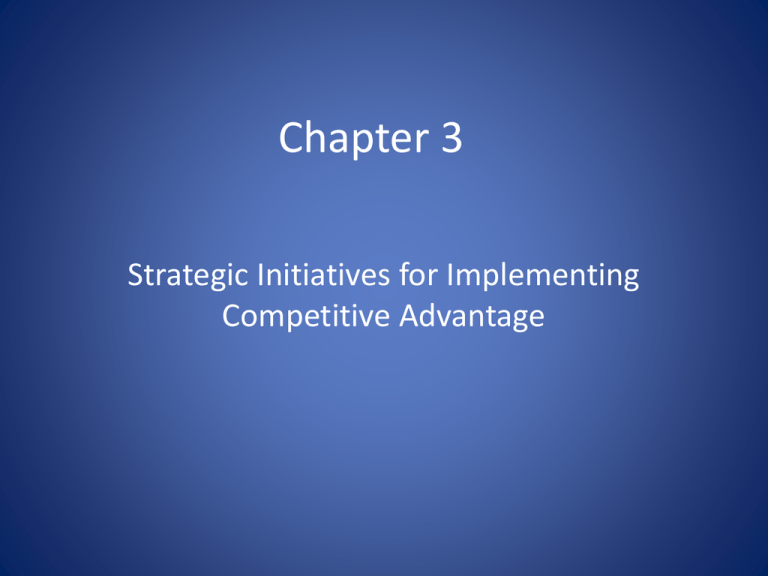
Chapter 3 Strategic Initiatives for Implementing Competitive Advantage Using IT to gain a competitive advantage • Businesses use IT to give themselves a – Customers product or service. • Major initiatives – Supply chain management ( ) – Customer relationship management ( – Business process reengineering ( ) – Enterprise resource planning ( ) ) Supply Chain Management • Supply Chain Management (SCM) – involves the between and among stages in a supply chain to maximize total supply chain effectiveness and profitability. • Players in the supply chain include: –S – Manufacturers and distributors –C –A , from the order being made until its delivery to the customer Supply Chain Management • Four basic components of supply chain management include: 1. Supply chain strategy – strategy for managing all resources to meet customer demand 2. Supply chain partner – partners throughout the supply chain that deliver finished products, raw materials, and services. 3. Supply chain operation – s 4. Supply chain logistics – p Supply Chain Management • Wal-Mart and Procter & Gamble (P&G) SCM Supply Chain Management • Effective and efficient SCM systems can enable an organization to: – Decrease the –I its own – Increase to reduce the threat of substitute products or services –C thereby reducing the threat of new entrants –I while seeking a competitive advantage Customer Relationship Management • Customer relationship management (CRM) – involves managing to increase customer loyalty and retention and an organization's profitability • CRM is not just technology, but a and business goal that an organization must embrace on an enterprise wide level • CRM can enable an organization to: – – – – Identify types of customers Design Treat Understand Customer Relationship Management • Customers contact organizations multiple times through numerous channels and CRM systems allow each of these contacts to be and Enterprise Resource Planning • Enterprise resource planning (ERP) – integrates throughout an organization into a so that employees can make decisions by viewing enterprise wide information on all business operations ( ) • Keyword in ERP is “ – SCM systems focus specifically on – CRM systems focus specifically on – ERP systems focus on departments and operations ” processes, Attention Students: Add your own details to the info found on the next slide since it contains a picture without any blanks. Add details about what is being illustrated and by the spreadsheets and the problems that might present, as well as how using an ERP system might resolve those issues. We don’t need this ERP stuff. We already have enterprise wide software that we are all using. It is called a SPREADSHEET. S a l e s A c c t g Enterprise Resource Planning • ERP systems from across an organization and correlates the data generating an that is consistent and • Common • C required • Real time • Consistent • O Business Process Improvement and Reengineering • B – a standardized set of activities that , such as processing a customer’s order • Business process (BPIR and/or BPR) – the analysis and within and between enterprises – The purpose of BPR is to make all business processes best-in-class – How can we do things better and more efficiently? Is there a • Try to avoid the • Maybe we need to start with a Finding Opportunity Using BPR • A company can improve the way it travels the road by moving from foot to horse and then horse to car – Follow the same path as before, but just do it faster • BPR looks at , such as an airplane which ignore the road completely Attention Students: Add your own details to the info found on the next slide since it contains a picture without any blanks. I would add details about what is seen in the picture Finding Opportunity Using BPR • Types of change an organization can achieve, along with the magnitudes of change and the potential business benefit In Summary • Information Technology can be an important of business success and innovation. • Information Technology is it the talents of when • In order for this to happen, you must have an of the entire business operation.
